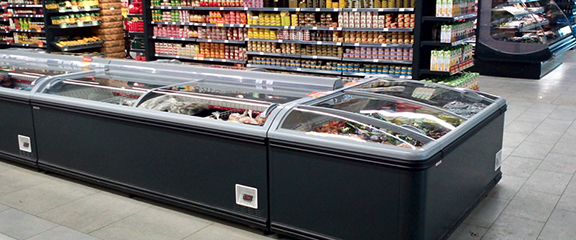Tuesday, October 4, 2016
At this year’s Food Marketing Institute’s Energy & Store Development Conference in New Orleans, Howell Feig, sales director for strategic accounts at AHT Cooling Systems USA, stated that through September 2016, the company had installed its propane plug-in modular island refrigerated cases in more than 600 U.S. stores. AHT Cooling Systems is a global company with North American headquarters located in North Charleston, SC. AHT’s propane refrigeration display cases – mostly modular islands and spot merchandisers — are in use in more than 1,000 U.S. stores mostly as a supplement to remotely cooled cases. 
Whole Foods Market has installed AHT’s propane cases in about 68 stores across the U.S., and by year’s end may have them in more than 100 stores, said Feig. ShopRite stores in the Northeast U.S. have them in a “fair number of stores,” noted Feig. Another retail chain he declined to name is using the modular islands in all of its more than 200 stores.
For its modular island displays, AHT, whose world headquarters manufacturing hub is in Rottenmann, Austria, is only offering propane models. “This is what we’re doing and what we think everyone should move to,” said Feig. The cases are limited by code to 150g of propane.
At least a half-dozen food retailers are considering installing self-contained propane units on a whole-store basis – in large stores as well as small – in lieu of a traditional rack system, said Feig. For complete store systems, AHT has designed multi-deck cases with top-mounted heat exchangers that rejects heat outside the store via a water-brine loop.
When AHT began marketing the propane cases in earnest in the U.S. about four years ago, end users were concerned about whether technicians were available to service them. To address that issue, AHT has established a nationwide network of external service providers as well as in-house technicians.
Retailers “want to feel comfortable, even though there’s little service needed because these are integrated factory-sealed cases,” said Feig. Originally limited to 220 V, the cases have been offered in 120 V models for the past two years.
Though R290 cases are about 10% more expensive than HFC cases, energy rebates are available to offset the cost premium. In a study of propane cases conducted by Southern California Edison, they were found to offer 20% energy savings compared to R404A cases.
Feig thinks the 150g charge limit may be raised. At a recent UN meeting, “they talked about how current charge limits are antiquated,” he said. “That should hopefully help move it along.”
(SOURCE: hydrocarbons21.com)

Whole Foods Market has installed AHT’s propane cases in about 68 stores across the U.S., and by year’s end may have them in more than 100 stores, said Feig. ShopRite stores in the Northeast U.S. have them in a “fair number of stores,” noted Feig. Another retail chain he declined to name is using the modular islands in all of its more than 200 stores.
For its modular island displays, AHT, whose world headquarters manufacturing hub is in Rottenmann, Austria, is only offering propane models. “This is what we’re doing and what we think everyone should move to,” said Feig. The cases are limited by code to 150g of propane.
At least a half-dozen food retailers are considering installing self-contained propane units on a whole-store basis – in large stores as well as small – in lieu of a traditional rack system, said Feig. For complete store systems, AHT has designed multi-deck cases with top-mounted heat exchangers that rejects heat outside the store via a water-brine loop.
When AHT began marketing the propane cases in earnest in the U.S. about four years ago, end users were concerned about whether technicians were available to service them. To address that issue, AHT has established a nationwide network of external service providers as well as in-house technicians.
Retailers “want to feel comfortable, even though there’s little service needed because these are integrated factory-sealed cases,” said Feig. Originally limited to 220 V, the cases have been offered in 120 V models for the past two years.
Though R290 cases are about 10% more expensive than HFC cases, energy rebates are available to offset the cost premium. In a study of propane cases conducted by Southern California Edison, they were found to offer 20% energy savings compared to R404A cases.
Feig thinks the 150g charge limit may be raised. At a recent UN meeting, “they talked about how current charge limits are antiquated,” he said. “That should hopefully help move it along.”
(SOURCE: hydrocarbons21.com)

